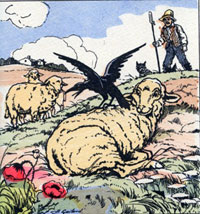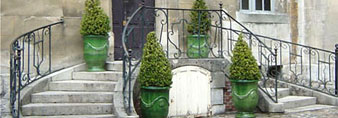THE ASTROLOGER IN THE WELL (II, 13)
A man star-gazing one day fell
Down to the bottom of a well‑
“ Blockhead ! you cannot see your feet,” they said,
“ And you pretend to read what's overhead.”
Without enlarging on our Quixote blind,
Many wise folks may here instruction find :
For on the earth, from end to end,
There are but few who don't pretend,
Among our learned silly race,
The Book of Fate to read by grace.
But this dread volume by old Homer sung,
Was it not Tyche by the ancients named ?
What we call Providence in our own tongue ?
Now science never birth from hazard claimed ;
And if it did, it would be wrong
To call it fortune, luck, or lot ;
All quite uncertain as we wot.
As to the purpose of the reign
Of that dread power who all things made,
And nothing but with wondrous skill ;
Who but Himself can that explain ?
And who th' eternal bosom dare invade ?
Hath He displayed in starry light
What time hath veiled in darkest night ?
And to what purpose ? to torment the mind
Of those who write about the globe and sphere ?
To sour the sweets of life we sometimes find ?
By this, inevitable ills to shun ?
Or from the good we taste in trembling run ?
And while anticipating pleasure near,
Turn it to poison ere it yet appear ?
’ Tis false, ’tis criminal to give accent,
That such instruction's in the firmament.
The cheerful sun, from day to day,
Succeeds the stars and shades of night,
And what can we dull mortals say,
Save that he shines and gives us light,
Rolls round the seasons, ripens all the fields,
And certain influence o'er bodies wields ?
Besides, in fate no constant laws are found,
While all the stars harmonious move around.
Begone from Europe then, star-gazing quacks,
And take the Alchymists upon your backs ;
Alike unworthy of our ear.
I know my style is too severe.
So to return, our star-man in the well
Was forced to drink more than he lived to tell ;
Just like all plodders o’er chimeras vain,
Who risk their lives, their business, and their brain. |
|
THE HARE AND FROGS (II, 14)
In his sad form lay a reflecting hare ;
For what else but reflect could he do there ?
Scared through the night, and harassed all the day,
To melancholy and to fear a prey.
“ That timid people,” thus said he,
“ Are truly wretched, well I see !
No good they get in all the food they find,
Doubt haunts their pleasure and assaults their mind. –
Such is my life—my wretched life,” he cries,
“ No sleep I know, except with open eyes.
Remove such fears, some wiser brain will say :
Indeed, is that so easy, pray ?
I make no doubt of what I hear,
That men, like me, are slaves to fear.”
Thus reasoned our poor hare,
And kept upon the watch
For every sound his ears might catch,
A prey to doubt and wasting case;
A breath, a shade, or sound upon the plains,
Kindled a fever in his veins.
While dreaming thus of his poor joys,
He heard, or thought he heard, a noise ;
A signal this for sudden flight--
Down through his hole of darkest night
He pierced; and gained the borders of a lake.
The frogs, alarmed, began to hop and quake ;
The frogs into their deepest grottoes fled.
“Ah, ha ! ” cried he, “ so I'am a cause of dread !
As others frighten me, so my bold face
Spreads terror through some other timid race !
Whence comes this intrepidity to me ?
I've trembling foes ; and they are fled afar,
And I am then a thunderbolt of war ! ”
The greatest coward on earth, I see,
May find a greater coward than he. |
|
|
THE COCK AND FOX (II, 15)
Old Chanticleer stood guard upon a tree,
And cunning gave the alarm at every noise.
“ Dear brother,” said the fox in softened voice,
“ The war is over, now ail beasts agree,
I come post-haste to let you know ;
Descend for friendship's sake,
And let’s embrace before I go,
I've many a weary stage to make,
Don't hinder me a moment, pray !
Both you and yours may wander free,
Without the smallest danger night or day,
Yes, we shall l now your brothers be,
Let bonfires tell the news to-night.
Meantime, dear brother, do alight,
And take from me the kiss of love ! ”
“ My friend,” replied his neighbour from above,
“ More welcome tidings never reached my ears,
And much the messenger the news endears.
I seetwo hounds in this direction bent,
Couriers, no doubt, upon the business sent ;
They run so rapidly ’tis like a race :
Stay, I come down, and we shall all embrace ! ”
“ Farewell,” said Reynard, “ I have far to go,
Some other day will suit as well, you know.”
So spake our spark, tucked up his things and ran,
Quite angry at the failure of his plan.
Old Chanticleer crowed jocund to his wit;
’Tis double mirth to see the biter bit !
|

The crow who wished to imitate the Eagle
|
THE CROW WHO WISHED
TO IMITATE THE EAGLE (II, 16)
A crow beheld an eagle rise
With a fat sheep up to the skies :
Of weaker loins, yet not less glutton,
He wished an equal weight of mutton;
Approached the numerous flocks with greedy eyes,
Marked out the best and fattest to be seen ;
A sheep reared to the sacrifice,
For the gods’ mouth, a dainty of high price.
“ I know not who thy nurse has been,”
Exclaimed the happy crow, with looks elate ;
“ But, faith ! thy body seems in wondrous state,
And I shall live in clover too,”
He said ; and on the bleating creature flew.
The goodly sheep was heavier than a cheese ;
Besides, the bushy thickness of his fleece,
All matted rough like Polyphemus’ beard,
Entangled poor crow's claws, who feared
It would not now be easy to retreat.
The shepherd came, took him with joy,
And gave him to his children for a toy.
Measure your forces, or you may be beat ;
Weak thieves should never imitate the strong ;
Evil examples tend to lead us wrong !
All are not lords who eat the people's gains,
And where the wasp has passed the gnat remains |
|



